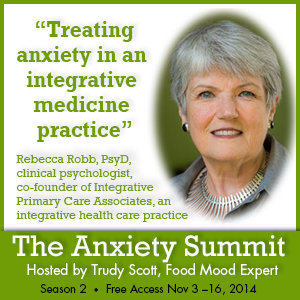
Rebecca Robb, PsyD clinical psychologist, co-founder of an integrative health care practice, Integrative Primary Care Associates, was interviewed by host of the Anxiety Summit, Trudy Scott, Food Mood Expert and Nutritionist, author of The Antianxiety Food Solution.
Treating Anxiety in an Integrative Medicine Practice
- What is integrated medicine
- What are the complexities of building an integrated medical practice
- Incorporating neuro-nutrition/amino acids into a psychotherapy practice
- Case studies using neuro-nutrition/amino acids and psychotherapy for anxiety, depression, panic attacks, family dysfunction, chronic pain, gut distress
Rebecca Robb incorporates neuro nutrition into her psychotherapy practice. This is what she says about neuro nutrition:
From my standpoint, for me, I think I use those words to describe the way in which I use supplements, specifically amino acids although I’m starting to use lithium orotate, and vitamins and supplements, vitamins and omega-3’s, that kind of thing. How I use those supplements and how I use dietary change and adjustment to affect mental health issues or to tweak mental health issues. That’s what I mean by neuro-nutrition.
I will tell you any therapist can describe to you, and I can go on and on, about what it’s like, for example, to be sitting with somebody who’s quite anxious and spending your time on deep breathing exercises and the kind of tools that I have traditionally been offered as a psychologist, and yet here’s this other tool where we can calm the patient’s body. Once they can get more of their physical symptoms under control, the level that we can go at in a psychotherapy realm is very exciting.
People come in to see a therapist and then kind of push you away because it’s too scary to deal with grief, it’s too scary to deal with the hard stuff, they’re afraid to become more depressed or more anxious or more – but when we can get the physiological symptoms more under control, we can go to really deep places and make wonderful progress from the psychological standpoint. I do it, so that I can do my work better; that’s why I’m so attracted to it. I watched people be able to grow more than I could ever imagine them growing with us just using the traditional tools of psychotherapy.
We discussed the amino acid questionnaire created by Julia Ross, author of the The Mood Cure. Here is the link to the blog from my talk: Targeted individual amino acids for eliminating anxiety: practical applications. You can get a copy of the questionnaire from here and read up more information on GABA. I am a big fan of GABA and find it to be very effective.
Rebecca has found phenibut (and Kavinace – a combo product that contains phenibut) to be more effective than GABA with her patients. This is one of the case studies that has me concerned about phenibut: Phenibut dependence
We present a case of a patient who used phenibut to self-medicate anxiety, insomnia and cravings for alcohol. While phenibut was helpful initially, the patient developed dependence including tolerance, significant withdrawal symptoms within 3-4 h of last use and failure to fulfil his roles at work and at home.
Rebecca mentioned two books: the book that covers a paleo style diet Practical Paleo: A Customized Approach to Health and a Whole-Foods Lifestyle by Diane Sanfilippo and The Defining Decade: Why Your Twenties Matter–And How to Make the Most of Them Now by Meg Jay, a guide for 20-somethings.
If you are not already registered for the Anxiety Summit you can get live access to the speakers of the day here www.theAnxietySummit.com